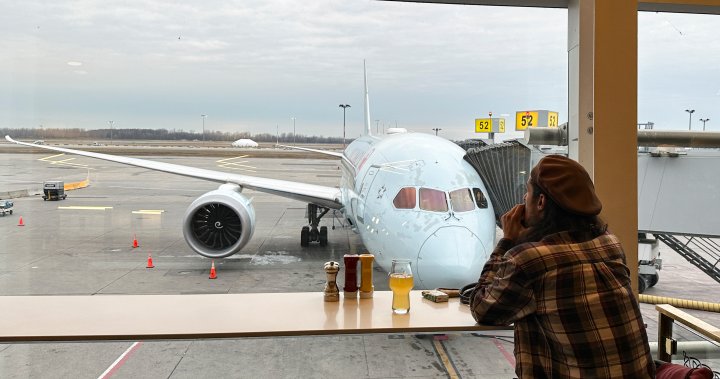Newly disclosed figures show the number of refugee claimants landing at Canada’s two largest airports has sharply increased in recent years, as the government struggles to process cases and remove people whose claims are rejected.
Around 72,000 people made refugee claims at airports between 2019 and 2023, according to numbers from the Immigration Refugee Board of Canada (IRB). That represents about 18 per cent of all refugee claims during that five-year period.
But even when cases are rejected, many claimants remain in Canada, new numbers from the Canada Border Services Agency show.
As of last month, the CBSA issued more than 28,000 “active warrants” to “failed refugee claimants.”
That number echoes reporting by Global News showing the government has also struggled to deport people found inadmissible to the country on national security grounds.

The main destination for the increase in claims by air travellers is Montreal’s Trudeau International Airport where the number of arrivals has increased nearly 10-fold between 2022 and 2023, according to the IRB.
Toronto’s Pearson Airport has seen refugee claims more than triple in that same period.
“It’s tiny when you compare it to refugee flows elsewhere in the world,” immigration and refugee lawyer Warren Creates told Global News.
“But these numbers are not numbers that Canada is accustomed to.”

Creates said it can take years to process cases because of significant backlogs, leaving refugee claimants in limbo. And when claims are rejected, the CBSA has “probably not done a good job knowing where all these people are and finding them,” he added.
The border agency and refugee claimant figures were released as part of answers to order paper questions filed in the House of Commons and released this week.
What’s behind the rise in airport arrivals?
Immigration experts point to the closure of Roxham Road, an unofficial border crossing point between New York State and Quebec.
The email you need for the day’s
top news stories from Canada and around the world.
The email you need for the day’s
top news stories from Canada and around the world.
With that “land port of entry that’s now blocked for many people,” refugee claimants may fly to Canada instead, Creates said.
In 2022, there were 3,325 refugee claims made at Montreal’s airport. In 2023, the year Roxham Road shut down, that number increased to 29,500.
The figures also show more than 90 per cent of refugee claimants who arrived in Montreal by air in 2023 were classified as “still waiting” for an answer on whether they could stay in the country.
“There have often been huge backlogs. That’s why throwing more money at this particular problem isn’t a straightforward solution,” said Michael Barutciski, a professor at York University’s Glendon College who specializes in Canadian public affairs, in an e-mail to Global News.
Ottawa closed Roxham Road, a route used by thousands of irregular migrants to enter Canada from the United States, in March 2023 as part of a deal between Prime Minister Justin Trudeau and U.S. President Joe Biden.
That year saw the highest number of refugee claimants at Canadian airports between 2019 and 2023. Most were Mexican nationals.
How is Ottawa responding?
Last month, the Liberal government brought back the visa requirement for Mexican citizens to Canada.
Immigration Minister Marc Miller said the measure “had to be taken” because of “exponential growth.” Asylum claims from Mexico reached a record high last year, but more than 60 per cent were either rejected or withdrawn, according to the IRB.
“You start scratching your head and saying, ‘increasing volume, low success rate,’ there’s a problem,” said Miller on Feb. 29, the day of the announcement.

Quebec Premier Francois Legault had pushed for the visa requirement to be reinstated, saying the influx has put pressure on the province’s housing market and health care and education systems.
Legault went as step further, asking Ottawa to hand over total control of immigration to the province.
But Trudeau has rejected the request, saying Quebec already has more say than anywhere else in the country on the issue.
Rather than jurisdiction, Creates said the biggest challenge is capability, with the immigration tribunal stretched thin.
“The Immigration and Refugee Board does not have the resources or the capacity to deal with this volume,” he said.
© 2024 Global News, a division of Corus Entertainment Inc.



